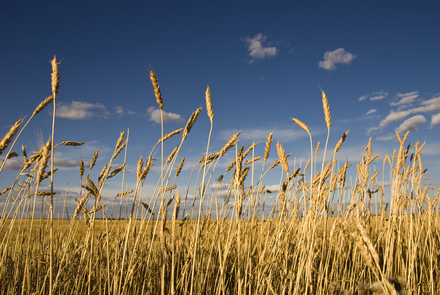Technology and agriculture give farmers new opportunities in changing market
Anna-Lilja Dawson
CUP Praries & Northern Bureau Chief

Farmers can now gather data from cloud computing. Photo courtesy madlyinlovewithlife/Flickr Creative Commons (CC BY-NC-ND 2.0)
SASKATOON (CUP) — University graduates are entering the farming industry with more ease and a heightened interest because of the high usage of modern-day technologies.
For years now young adults have been becoming more and more adept with technologies that infiltrate every aspect of their lives. As these adults enter the workforce they bring an entirely new skill set— especially in agriculture.
Farmers marketing their own grains can do so with a variety of methods involving business done in-person, over the phone, on the internet and through smartphone applications. There has been a significant rise in the use of the internet and apps in farming, said Alberta Minister of Agriculture and Rural Development Verlyn Olson.
Olson said that one of the leading causes for the dissolution of the Canadian Wheat Board’s monopoly over wheat and barley was driven by the high use of technology and automated systems in the other open-markets. In 1935 the federal government established the CWB as the sole marketing body for barley, wheat and oats — which were removed from the board in 1989. Off-board crops have been able to progress with advanced marketing techniques due to the freedom present in the open-market.
Now farmers can market all of their crops in an open-market environment using technology to the best of their abilities to get the highest return.
Olson said the “new system of marketing is very complimentary to technology and vice-versa” and that he sees it being attractive to young farmers.
“I think that farmers who are internet savvy and who are wanting to do their trading on their own, which tends to be younger farmers, [are] probably the ones the most comfortable with the new system and that ‘s probably fair comment,” Olson said, adding that the CWB monopoly made cutting edge marketing tools unnecessary.
Dale Horner has been farming with his father near Blaine Lake and Krydor, Sask. for the last 40 years. When Horner took over the marketing side of the business he worked over the phone or by walking into the local grain elevator.
Today Horner checks the weather from his iPhone, keeps tabs on the market from his home computer and has a GPS system built into his seeder and combine. But Horner warned that with increasing readily available information and the termination of the CWB monopoly, came a rise in the responsibility and ownership he had to take over his own farming operation.
“You have a better grasp of what’s going on on your farm now,” Horner said. But “you don’t have anybody looking after it for you, so you have to really be aware of what’s going on in the market and what’s going on in your own farm.”
Horner said he is confident in the fact that having technology so deeply incorporated into farming will be a key factor in younger generations getting into farming, especially those starting out on a smaller scale farm.
Clay Casavant, second-year University of Saskatchewan student, plans on continuing the family farm after he completes his education degree and finds modern farming more attractive than ever. His family’s marketing system is a step up from the Horners’ in many ways and Casavant is eager to get into the game.
For the last three years, Casavant’s father, who currently manages the farm’s marketing, has been receiving daily text messages informing him of the day’s price for his selected grains and works closely with grain brokers and local elevators. The Casavants can set their preferred price at the elevator which automatically sells their grain when the market price is right, leaving the family to tend the farm and the grain to market itself.
Casavant said the system his family has now makes farming grain much more efficient and easier by saving valuable time that would have been spent making phone calls or searching on the internet.
Despite his awareness of the challenges small scale farmers face when starting out, Casavant sees himself and his peers slipping into farming operations much easier than the preceding generations.
“I really enjoy farming and I want to do it,” Casavant said. “I’m going to work through it and I’ll do whatever it takes for me to be a farmer and have a family with it.”

